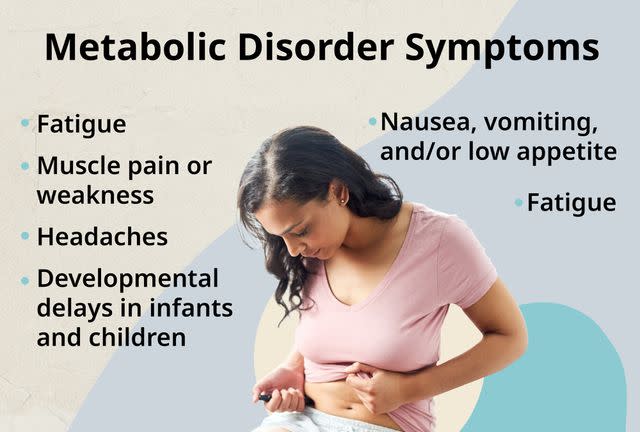What Are Metabolic Disorders?

Photo composite by Michela Buttignol for Verywell Health; Getty Images
Medically reviewed by Karina Tolentino, RD, CHWC
Metabolic disorders are medical conditions that impact your metabolism, a wide array of processes that enable proper bodily functioning and balance. There are two main parts to metabolism: catabolism and anabolism. Catabolism is the process of breaking down carbohydrates, protein, and fat from food, which releases energy. Anabolism is the process that uses that energy to build, repair, and grow.
Certain conditions can affect metabolism, impacting the body’s ability to achieve balance, whether it be difficulty breaking down certain nutrients or regulating growth and development. These disorders may be genetic and present at birth (congenital) or develop throughout a person’s lifetime.
This article will discuss the most common metabolic disorders, the causes of these diseases, and treatment options for people living with them.

Photo Composite by Michela Buttignol for Verywell Health; Getty Images
Types of Metabolic Disorders
There are hundreds of disorders that can impact different aspects of human metabolism. Most of these conditions are rare, inherited conditions, but some, like diabetes, are more common. The following are some of the most prevalent metabolic disorders.
Diabetes Mellitus
Diabetes impacts your body's ability to regulate blood glucose levels or blood sugar. Type 1 diabetes is an autoimmune condition in which the pancreas stops producing insulin, the hormone that helps glucose travel from the blood into cells.
In type 2 diabetes, the body will still produce insulin, but cells may become resistant to the hormone, impacting their ability to take in glucose from the blood and raising blood sugar levels.
Phenylketonuria (PKU)
Phenylketonuria (PKU) is an inherited metabolic disorder that impacts the body’s ability to break down phenylalanine, an amino acid found in dietary protein. People with PKU are deficient in phenylalanine hydroxylase, the enzyme needed to break down proteins that contain phenylalanine.
Maple Syrup Urine Disease
In maple syrup urine disease, the body cannot break down leucine, isoleucine, and valine, a group of amino acids known as branch-chain amino acids (BCAAs). BCAAs can build up to toxic levels in the blood, causing damage to the nervous system and the brain if untreated.
Hemochromatosis
Hemochromatosis is a disease that causes excess iron to build up in the body. This hereditary metabolic disorder causes individuals to absorb too much iron, leading to iron overload.
Urea Cycle Disorders
Urea cycle disorders are a group of conditions that impact various stages of the urea cycle, the process the body uses to get rid of waste. The most common type of urea cycle disorder is ornithine transcarbamylase deficiency.
Tay-Sachs Disease
Tay-Sachs disease is an inherited condition that affects the function of an enzyme called hexosaminidase A, which is needed to metabolize a fatty compound called GM2 ganglioside. This can lead to nerve damage, blindness, deafness, and mental and physical degeneration.
Metabolic syndrome is a condition that is not caused by an autoimmune response or genetic mutation like some of these disorders. The five conditions associated with metabolic syndrome are:
High cholesterol
High triglycerides
High blood sugar
Excess abdominal fat
To be diagnosed with metabolic syndrome, you must have at least three of the five markers.
Metabolic Disorder Symptoms
The symptoms of metabolic disorders will vary depending on the part of metabolism being impacted. Many of these conditions are evident from birth, but some symptoms may not develop until later. Common symptoms among metabolic disorders include:
Fatigue
Muscle pain or weakness
Headaches
Developmental delays in infants and children
Nausea
Vomiting
Low appetite
What Causes a Metabolic Disorder?
In many cases, metabolic disorders are caused by genetic mutations. This means that one or more genes are altered so that they no longer function properly. Genes are responsible for coding for enzymes that facilitate the metabolism of different nutrients.
For example, mutations in three genes in maple syrup urine disease code for an enzyme called branched-chain alpha-keto-acid dehydrogenase (BCAD), which breaks down BCAAs.
These genetic mutations are often passed down from one or both parents. If both parents carry one mutated recessive gene in a gene pair, though they may not have the disorder, they still can pass down the gene to their offspring, who will have the disease.
Other metabolic disorders, like diabetes, can be caused by organ dysfunction. Type 1 diabetes is considered an autoimmune disease with various contributing factors, both genetic and environmental.
How Are Metabolic Disorders Diagnosed?
Most metabolic disorders are diagnosed through genetic testing, which may involve a blood draw, cheek swab, saliva sample, or heel prick in newborns. This will provide a sample of DNA that can be sequenced and checked for genetic mutations.
Genetic testing may be ordered to confirm if a healthcare provider suspects a metabolic disorder based on symptoms.
Treating Metabolic Disorders
Treatment will depend on the type of metabolic disorder you have. Often diet modifications are necessary. A healthcare provider may advise limiting or restricting the nutrients or substances your body can't metabolize.
In some cases, such as with Tay-Sachs disease, treatment may focus on reducing symptoms using anti-seizure medications. In the case of type 1 diabetes, individuals must monitor their blood sugar levels and inject themselves with insulin, the hormone their body does not produce.
Summary
Metabolic disorders are a group of medical conditions that impact the metabolism, the many processes in the body that break down nutrients and convert them to energy. These disorders are often genetic and present at birth, though some may develop later. Treatment for metabolic disorders will vary but usually involve lifelong diet modifications or medication.

